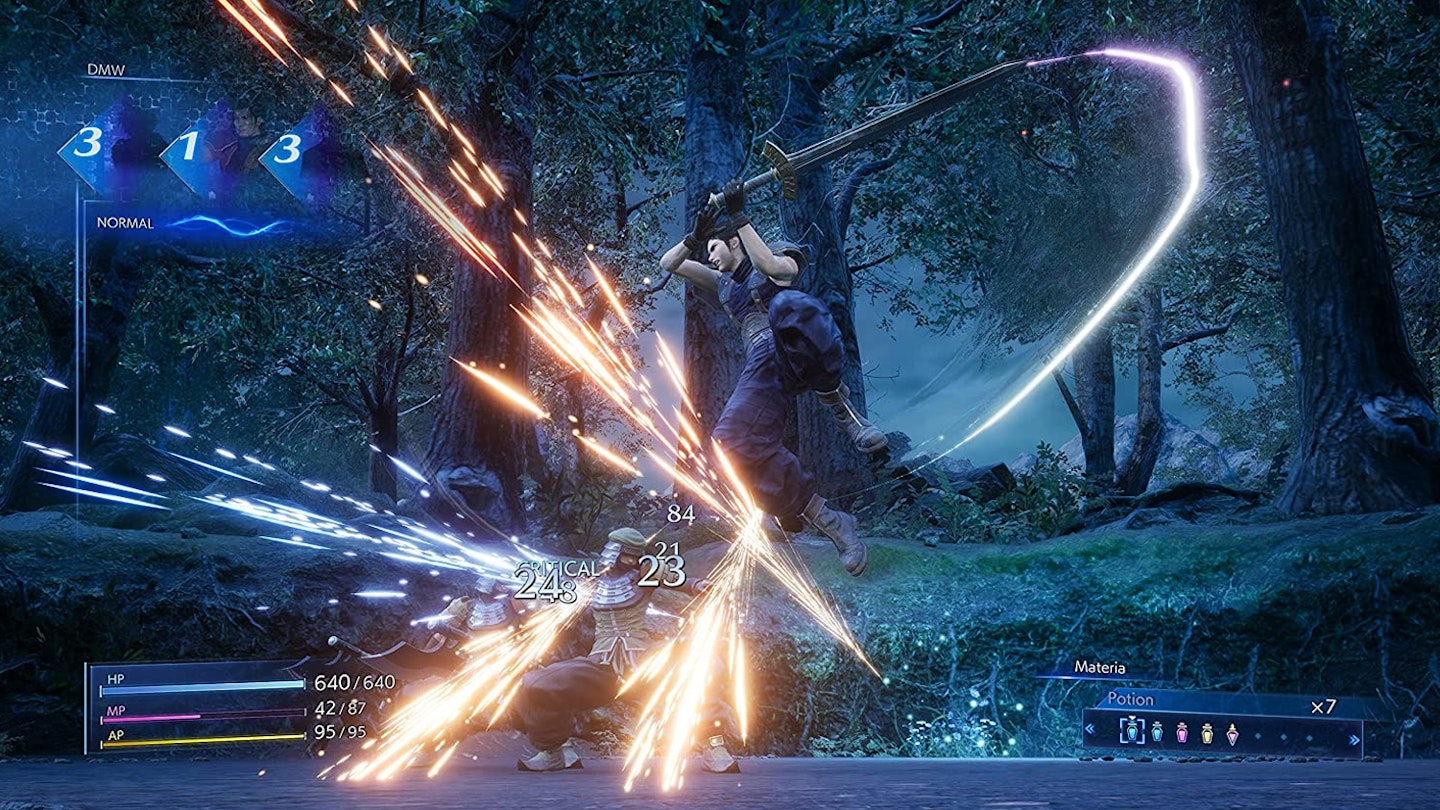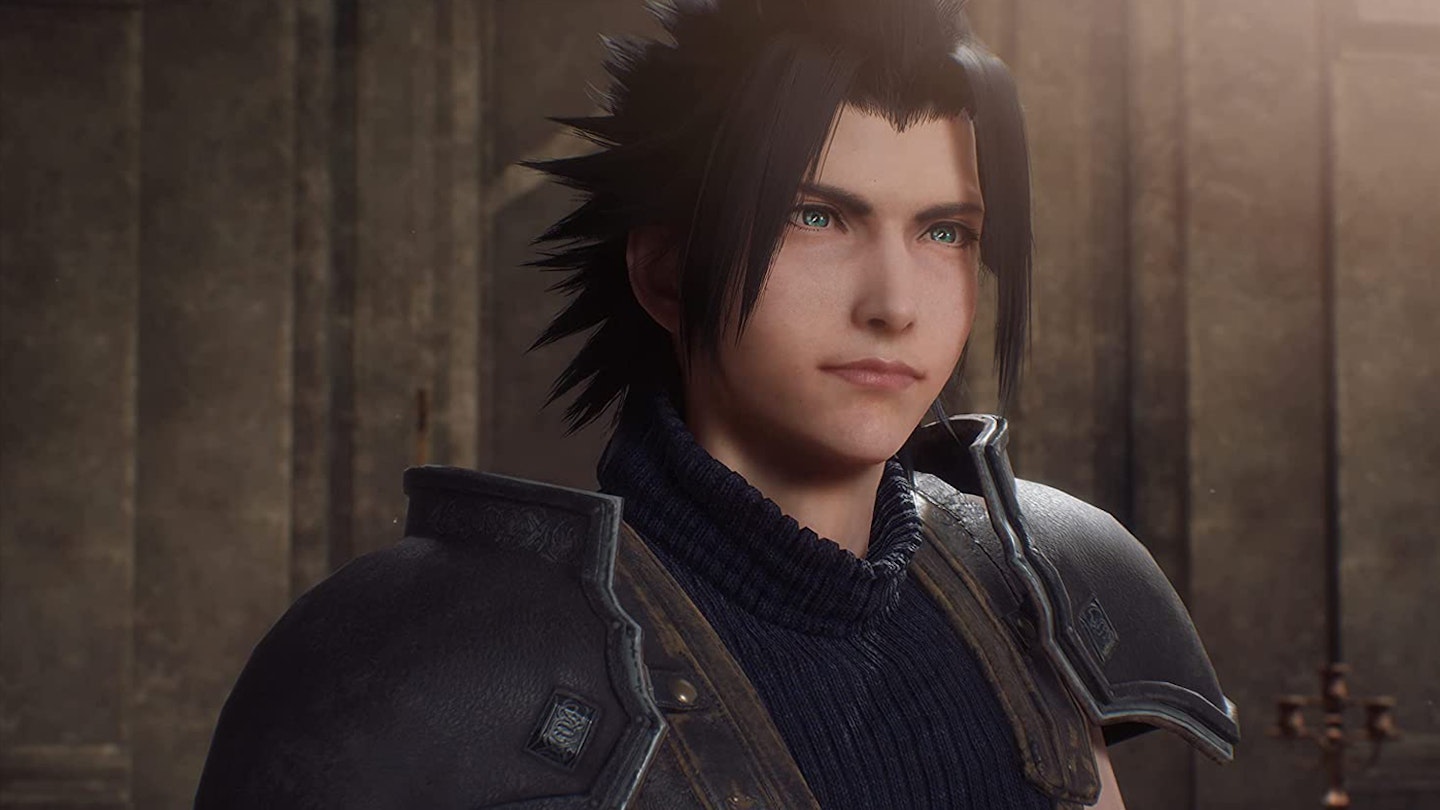Platforms: PS5, PS4, Xbox Series X, Xbox One, Nintendo Switch, PC
One of the biggest questions fans of Square Enix’s most famous Final Fantasy had when Final Fantasy VII Remake landed in 2020 was whether the earlier spin-offs of the PS1 original still ‘counted’ in the series’ broader narrative. Remake director Tetsuya Nomura was deflective, sometimes saying titles like the PSP’s Crisis Core wouldn’t fit any more, other times saying it was up to fans to decide for themselves. Now, we have a clear answer in Crisis Core: Final Fantasy VII Reunion – the backstory of Cloud Strife’s predecessor Zack Fair as he rises through the ranks of the Shinra company’s private army SOLDIER not only remains canon, but it’s received a remaster that almost brings it up to speed with the generation re-defining quality of Remake itself.

‘Almost’ is key – while Reunion benefits from a significant upgrade compared to its handheld roots, this isn’t a glow-up on par with Remake. It now boasts fully-voiced characters, with actors returning from Remake to better unify the games, and massively-improved character models and environments, but underneath the glossy visuals – not quite so glossy as Remake, though, with the opening pans over Midgar City looking almost grainy and unfocused – it remains a PSP game at heart. The means a greater focus on action, missions that still show signs of being designed for play in brief bursts on commutes or lunch breaks, and far less exploration. Even structurally, its locations are smaller than those in Remake, while side missions accessible from any save point will test players’ patience as much as their skills by throwing up repetitive maps to hack through enemies in. Perhaps most annoying is the return of random battles, which feels positively regressive now.
That’s not to say Reunion is devoid of improvements though, with some of the main enhancements to be found in combat. The biggest quality of life improvement is found in how Materia – the FF7-verse’s magic-granting gemstones – works. On the PSP, you’d have to awkwardly cycle through the Materia you had equipped, then select the one you wanted to use – not an ideal system when the game had traded the turn-based battles of FF7 for zippy real-time encounters that combined attacks, dodges, and blocks. Now, though, you simply hold down R1 (on PS5/PS4, version tested) and select whichever skill you have mapped to another button. It’s a small change, but one that has massive benefits to the flow of battles.
While real-time combat is far more familiar to players nowadays than it may have been back in 2007, Crisis Core’s returning Digital Mind Wave system remains a conundrum. Referred to as the DMW, it’s a slot machine gimmick that constantly spins in the upper left of the screen during fights, randomly matching character icons and numbers. Numerical matches give Zack bonuses, such as removing the MP cost to use magic, or making him temporarily invulnerable, while image matches can power up currently equipped Materia or increase Zack’s level. As you progress through the game, more characters and even summons will be added the DMW, expanding the variety of effects that can occur in the midst of battle.

On the PSP, a “modulating phase” of the DMW would interrupt encounters, filling up the screen and robbing the player of any real control. Thankfully, these are now gone, making each fight faster and smoother. However, the biggest frustration with the DMW remains its randomness, removing – particularly in the earliest sections of the game – any meaningful way to use key abilities as the player wants. It’s typically better to focus on which stat-boosting accessories Zack has equipped to exert any significance over combat performance, and anything the DMW rolls up in your favour is a bonus.
Materia Fusion offers another way to modify combat though, allowing you to combine gems into new forms to build up the perfect arsenal of equipped skills and spells. For instance, one of Zack’s key moves early on is Assault Twister, a whirlwind of sword strikes that draws on his pool of ability points rather than magic. Combine that with a magic Materia, say Blizzara, and you’ll be able to dish out ice magic damage with each flurry of strikes, without costing MP. Crisis Core rewards clever thinking in its crafting system, and it always feel rewarding to stumble on a combo that ‘tricks’ the game’s own cost rules.
It’s Zack himself who remains the game’s greatest appeal, though. Partly, that’s down to Crisis Core exploring a character who’s become almost mythological by the time of Final Fantasy VII itself, and getting to see first-hand his connection to iconic characters such as Aerith, Sephiroth, and of course Cloud himself. In his own right, Zack’s a joyful, exuberant young SOLDIER – although he’d more likely describe himself as an aspiring hero – and it’s almost impossible to dislike him. He’s a million miles removed from the surly, detached Cloud, right down to their names being deliberately contrasted.
Yet Zack’s cheery optimism is also the source of Crisis Core’s deepest tragedy – he’s not the hero. He’s a warning of how well-meaning people can be twisted to do evil in the name of duty, never realising the harm he’s causing or the horrors his masters perpetuate. Many of the game’s missions involve Zack acting as Shinra’s well-trained attack dog, from slaying the defenders of ‘enemy’ nation Wutai to snitching on anti-Shinra dissidents in Midgar, and he rarely questions his orders – even as his own mentor, Angeal, goes rogue early on. Whether fans coming to Crisis Core, especially a new generation brought in by the success of Remake, pick up on that, or care more about seeing those fan-favourite characters is another matter – but it remains one of the sharpest bits of writing in the whole FF7 saga.
However, while it’s great to see Crisis Core given a much-needed dust-off, the result is ultimately not of the same calibre as Remake. While Square Enix calls Reunion “more than a remaster”, a remaster is really all it is – the bones of its portable origins remain the skeleton even now. What worked on PSP still works, and much of what didn’t has largely been massaged into something better, but anyone expecting an upgrade on par with Remake will be disappointed. It remains a key chapter in the grander saga of Final Fantasy VII, but with its stranger mechanical flourishes, it’s a better story than it is a game.
